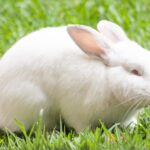Can Rabbits Eat Tulips? The Surprising Truth Revealed
Rabbits are adorably fluffy creatures that bring joy to our lives. As responsible pet owners, it’s essential to ensure their health and well-being. One common question that often arises is whether rabbits can safely consume tulips. Unfortunately, the answer is no, and here’s why.
The Dangers of Tulips for Rabbits
Tulips, with their vibrant colors and distinctive shapes, may be appealing to both humans and rabbits alike. However, these lovely flowers pose significant health risks to our furry friends. The bulbs, flowers, and even the stems of tulips contain toxic compounds known as tulipalin A and B.
When ingested, these substances can lead to severe gastrointestinal problems in rabbits. Symptoms may include diarrhea, stomachaches, excessive drooling, and even loss of appetite. In some cases, rabbits may experience more severe reactions, such as difficulty breathing or even respiratory collapse.
Potential Symptoms and Reactions
If your rabbit accidentally consumes tulips, keep a close eye on their behavior and watch out for any unusual symptoms. Common reactions may include gastrointestinal upset, such as vomiting or diarrhea. Rabbits may also exhibit signs of discomfort, such as excessive pawing at their mouth or refusal to eat.
In more severe cases, your beloved pet may display respiratory distress, such as difficulty breathing or wheezing. It’s crucial to monitor them closely and seek urgent veterinary assistance if you notice any worrying signs.
Safe Food Alternatives for Rabbits
While tulips are a no-go for your bunny, there are plenty of other tasty and safe options to keep them happy and healthy. Rabbits generally thrive on a diet of fresh hay, high-quality pellets, and a variety of leafy greens. Some excellent choices for rabbit-friendly foods include carrots, celery, broccoli, and parsley.
Remember to introduce new foods gradually to ensure your rabbit’s digestive system adapts comfortably. Always consult with your veterinarian to determine the best diet plan for your furry companion.
Preventing Access to Tulips
Prevention is key when it comes to safeguarding your rabbit’s well-being. To prevent accidental consumption of tulips, make sure to keep them out of your furry friend’s reach. If you have tulips in your garden, consider fencing off the area or using planters that are inaccessible to rabbits.
It’s also essential to educate yourself and your family members about the potential dangers of tulips for rabbits. By being aware of the risks, you can maintain a safe environment for your pet and minimize the chances of any mishaps.
Conclusion
In conclusion, rabbits should not be allowed to eat tulips due to the toxicity of their bulbs, flowers, and stems. The ingestion of these beautiful flowers can lead to significant health concerns, such as gastrointestinal issues and potential respiratory distress. To ensure your rabbit’s well-being, provide them with a balanced diet of hay, pellets, and rabbit-safe vegetables. Keep tulips out of their reach and be vigilant about potential hazards. Responsible pet care is essential for keeping our beloved rabbits healthy and happy.






